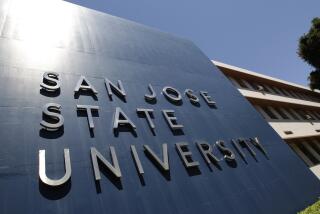Banned Track Coach Seeks Reversal by the USOC
- Share via
RALEIGH, N.C. — The lawyer for Justin Gatlin’s track coach asked the Unites States Olympic Committee to lift its ban of Trevor Graham on Tuesday, saying he passed a lie-detector test when he denied giving performance-enhancing drugs to athletes.
Joe Zeszotarski said Graham would pursue “all legal avenues” to regain access to the USOC’s training centers and training sites.
“Trevor has stepped forward and provided affirmative evidence -- this polygraph result -- that he is telling the truth,” Zeszotarski wrote in a six-page statement. “We look forward to the USOC explaining why it should pursue a restriction against Trevor, when Trevor is telling the truth, and has never distributed any illicit substance to any of his athletes.”
But the USOC said Tuesday it would not reconsider its decision.
“Access to our training facilities is a privilege, not a right, and we are operating fully within the scope of our authority,” said USOC spokesman Darryl Seibel. “We are committed to being a leader in the fight against doping in sport.”
Graham operates Raleigh-based Sprint Capitol USA, a team of about 10 athletes that includes Gatlin.
The co-world-record holder in the 100 meters faces a lifetime ban after testing positive for testosterone or other steroids in April following a track meet in Lawrence, Kan. Gatlin has denied doping, and Graham has accused Oregon massage therapist Chris Whetstine of rubbing a steroid cream on Gatlin to trigger the positive test. Whetstine has denied the allegations.
Graham, who once trained five-time Olympic medalist Marion Jones, has been involved with at least half a dozen athletes who have received drug suspensions.
Me’Lisa Barber, a sprinter who trains with Graham, said she wouldn’t decide whether to stay with the coach until after her season ends.
The ban “didn’t just affect one person,” Barber said in a phone interview last week. “It’s going to affect probably all the athletes in a major way. Everything’s kind of up in the air.... I just want to stay focused and worry about my next meet.”
Graham helped trigger the federal investigation of the Bay Area Laboratory Co-Operative three years ago by anonymously mailing a syringe containing “the clear,” a previously undetectable steroid, to the U.S. Anti-Doping Agency. At the 2004 Athens Olympics, Graham acknowledged mailing the drug.
Zeszotarski said the lie-detector test results also refute claims made by Angel Guillermo Heredia, who formerly worked with Graham.
Heredia told a San Francisco grand jury and investigators that he supplied performance-enhancing drugs to the coach and many of his athletes, including Jones, C.J. Hunter, Tim Montgomery and Michelle Collins, the New York Times reported last month.
“Trevor has previously been told that he is a witness in the BALCO investigation,” Zeszotarski said. “No one from the government has told him he is any sort of target.”
More to Read
Go beyond the scoreboard
Get the latest on L.A.'s teams in the daily Sports Report newsletter.
You may occasionally receive promotional content from the Los Angeles Times.






